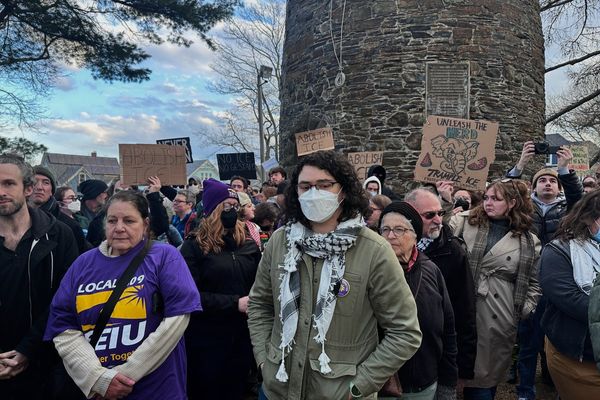A "happy" four-year-old boy died when an underlying condition caused his heart to suddenly stop.
George Thomas Spencer died on March 19, 2021, after staff at St James Primary School in Clitheroe, noted his breathing was "raspy". When mum Danielle collected George from after-school club she noticed he was having difficulty breathing, so his dad Terry took George to the GP.
Dr Jill Osgood saw George at Clitheroe Health Centre that day. At an inquest at Accrington Town Hall today (June 13) Dr Osgood said she had experience of patients with croup - which George had a history of - which can be "variable in its presentation".
READ MORE: 'Monster' knew what he had to do minutes after watching Little Boy Blue
However, after assessing George, Dr Osgood said she found his heart rate, temperature and oxygen saturation were all "within the normal parameters". She said: "He was very chatty and joking, speaking in full sentences, there was no hoarse voice but I did hear noisy breathing."
George, who has an identical twin called Arthur, was taken back home but later that evening his parents noted a deterioration in his condition. At around 7.15pm they noted his lips were blue and called an ambulance, Lancs Live reports.
A neighbour, who was a qualified first responder who had trained paramedics in using defibrillators, got a nearby machine which issued a shock to George's heart. Paramedics then arrived at their home in Milton Avenue, and carried out resuscitation attempts for some time before arriving at the Royal Blackburn Hospital at around 8.30pm.
Paediatric consultant Dr Peter Fitzmaurice said he was called at 7.30pm ahead of George being brought in. Dr Fitzmaurice said: "They were having to resuscitate him at home which was why it was taking so long. George arrived at about 8.30pm but after continued cardiac compressions there had been no output.
"Resuscitation was very unlikely to have been successful. George was brought in, we did a quick assessment and I went to speak to parents to say there was no signs of life."
A post mortem revealed the cause of death was myocarditis - a "notoriously difficult disease to diagnose", Dr Fitzmaurice said, which can develop after a viral infection and causes inflammation of the heart muscle. The inquest heard that, even if George had been sent to hospital from the GP surgery, he would likely not have been given an ECG which would have detected the myocarditis.
The doctor added: "From what mum and dad told me about George that day, he was running round he wasn't showing any signs of the heart failing in the build-up or two weeks before so there were no signs that George's heart was compromised.
"If you come into hospital it would still have been difficult to diagnose especially if there was croup beside it. We would have managed the croup because that was staring you in the face and we would have brought the tachycardia [fast heart rate] down."
The inquest was told myocarditis can be caused by an infection. Area Coroner Richard Taylor asked Dr Fitzmaurice if the croup had contributed to George's death.
The consultant said it was "impossible to say with certainty" but added: "I think that the croup did contribute to the irregular heartbeat but I can't say that 100 per cent. But the myocarditis could have proved fatal without the croup."
George's parents, who attended the inquest, asked Dr Fitzmaurice if steroids prescribed by the GP would have prevented his death. He said: "It may have resolved the croup which may have taken the stress off the heart but the myocarditis could have progressed and three weeks later he could have been in hospital".
Ultimately, Dr Fitzmaurice agreed that the croup "could have been irrelevant" and that the myocarditis could have proved fatal on its own. He added: "He could have had a cardiac arrest that night without the croup."
Pathologist Dr Jo McPartland from Alder Hey Hospital, who concluded the medical cause of George's death was myocarditis, said his heart was "significantly enlarged" and was the size of a heart expected for a nine-year-old.
Dr McPartland said: "It's a rare condition but I have seen a few cases of sudden, unexpected death in children from myocarditis. One child was admitted to hospital, thought to have pneumonia but then died and another died in their sleep. We often don't know it's there until we do a post mortem and examine the heart tissue."
Returning a narrative conclusion the coroner said: "The 19th of March last year should have been a normal day. George was at school, all appeared to be fine until half an hour before he was being collected. He had a rasping sound in his voice and that was reported to his mother who collected him.
"The doctor believed, from the tests and examination, that this was more likely than not to be a respiratory tract infection and George was sent home with an inhaler. Within an hour and a half or so George had stopped breathing and despite the best efforts of neighbours and paramedics he was taken to hospital where he was sadly pronounced dead.
"The family have concerns; why was he not given steroids or sent to hospital? Dr Osgood said the tests did not indicate croup and it was only at the post mortem that the true picture was revealed. Not only was there croup but also inflammation of the heart muscle which was likely to have been present for some time.
"George Thomas Spencer died on March 19, 2021, from an inflammation of his heart to which more likely than not a contributory factor was an undiagnosed viral infection."
After George's death his family and friends raised more than £8,400 to install defibrillators around Clitheroe as well as a memorial bench at the nearby beauty spot of Edisford Bridge where the family enjoyed spending time.
Receive newsletters with the latest news, sport and what's on updates from the Liverpool ECHO by signing up here
Emmerdale fans floored as Kim Tate 'replaced'
Top chef says people have been using tin foil the wrong way
Rare 50p coin sells for £135 with thousands more in circulation










